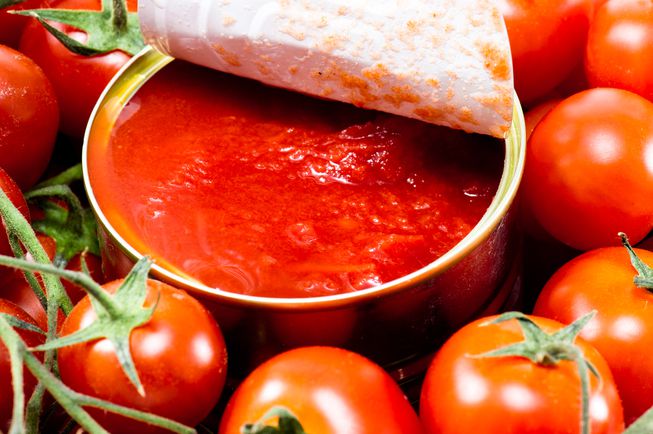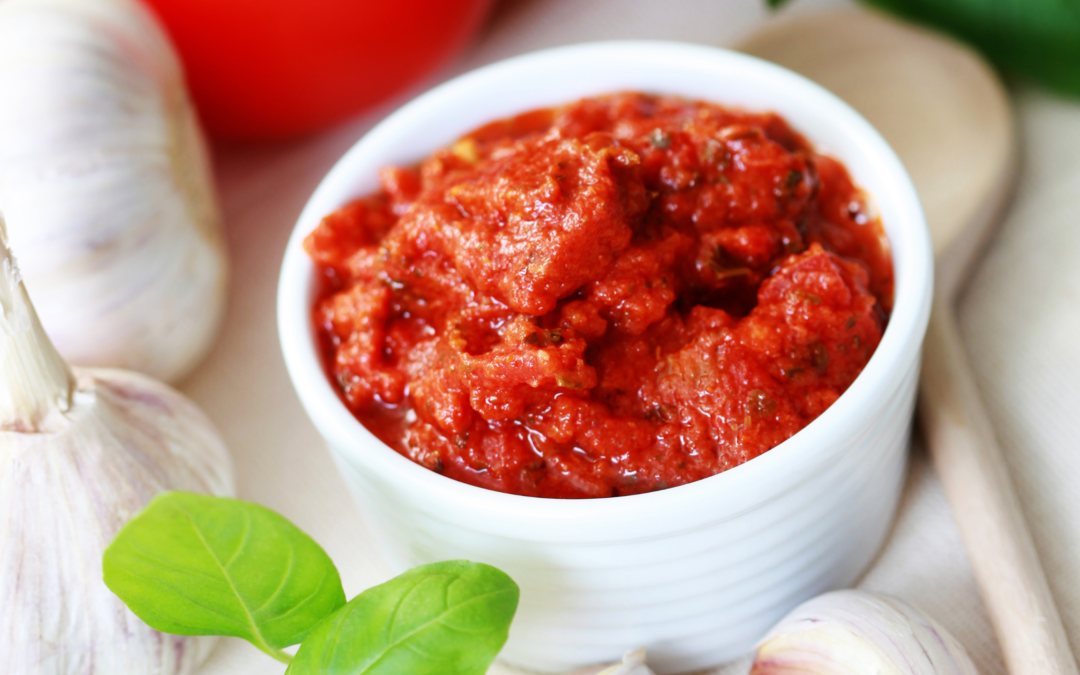
by Tomato Wellness | Mar 4, 2021 | Recipes
This tasty main dish for Pizza Stuffed Chicken combines the classic Italian flavors of pizza with protein-packed chicken to make a tender, delicious meal. Canned tomatoes are the star ingredient, making this a convenient and pantry-friendly recipe. Canned tomatoes are also packed with nutrients, including tons of antioxidants, vitamin C, and cancer-fighting lycopene, the compound that gives tomatoes their bright red color. Lycopene has been shown to help prevent cancer, and people who eat more tomato products reduce their risk of developing prostate cancer. This recipe can be customized with your favorite pizza toppings, from pepperoni to black olives. To sneak in some extra veggies, try stuffing with spinach, broccoli, or green peppers.
This dish couldn’t be easier and makes a great weeknight dinner that’s healthier than ordering in delivery pizza. All you have to do is slice the chicken breast to make a pocket and stuff with sausage, diced tomatoes, and mozzarella. Next you’ll bake the chicken and top with more mozzarella, tomatoes, and grated parmesan. You can feel good about feeding this meal to your family, as it’s full of lean protein from chicken breast, as well as fiber, vitamins, and minerals from canned tomatoes. This meal is also budget-friendly, as canned tomatoes are a great affordable alternative to fresh tomatoes that still provide plenty of nutrients and pack in the same flavor punch. We love serving Pizza Stuffed Chicken alongside whole grain spaghetti and a garden salad to create a balanced, filling meal that everyone will enjoy. For the full recipe, visit our friends at Red Gold.
For other delicious recipes, check out some of our favorites:
Chipotle Tomato Rice POWER Bowl
Swiss Chard Pecan Lasagna
Black Bean Corn Chili

by Tomato Wellness | Mar 4, 2021 | Health, News
Did you know that you can seriously reduce your odds of getting cancer by what you put on your plate? You can help fight off this devastating disease by loading your plate with disease-fighting plant foods that are rich in a rainbow of phytochemicals which can provide anti-cancer, antioxidant, and anti-inflammatory activities in every bite. Tomatoes are one food that will help lower cancer risk, as lycopene has been shown to be inversely related to cancer mortality.
In a study written by Cambridge Press University, researchers reviewed the correlation between tomato and lycopene consumption and cancer mortality in a prospective demographic cohort. With the help of the National Health and Nutrition Examination Survey of 1999-2010, the study was able to be conducted successfully and thoroughly. The participants of this study included individuals who consumed tomato and lycopene products in order to determine how the intake of these foods can improve health and reduce cancers risks. With this being said, other factors that may have contributed to decreased longevity of one’s lifespan were taken into consideration so that the data was accurate. The results of the study showed that tomato and lycopene consumption were inversely related to cancer mortality. However, the study suggests that there was no apparent evidence that supported the impact of tomato when comparing older versus younger adults and obese versus non-obese individuals. This enables us to conclude that age and weight were not a contributing factor to the results of this study. Additionally, the results provide sufficient evidence that tomato consumption may have potential benefits in terms of cancer risk reduction.
Other studies have also shown that increased tomato consumption, whether it’s canned or fresh, can reduce prostate cancer in men, decrease cardiovascular diseases, and enhance nutritional value in your daily diet. Thus, canned tomatoes should be a staple in your diet because they are not only nutritious, but they are affordable, easily accessible, delicious, and versatile as well! So the next time you’re at the grocery store, grab yourself some canned tomatoes. They can be incorporated into pastas, pizzas, stews, curries, and more!
For other tomato news, check out:
Top 11 Reasons to Go Red with Tomato Products
Can Tomatoes Help Your Kid Eat More Veggies?
What is Lycopene?

by Tomato Wellness | Mar 3, 2021 | Recipes
Looking for an affordable, no-fuss recipe that your whole family will love? Give this Meatball Parmesan Hot Dish a try. It requires only one dish and makes use of canned veggies and frozen meatballs for an inexpensive, pantry-friendly dinner. Jarred tomato sauce and diced tomatoes add a bright, tangy flavor, and pack in the nutrients. Lycopene, the plant compound that gives tomatoes their signature red color, is a powerful antioxidant shown to help prevent certain cancers, including prostate cancer. Get your daily dose of lycopene, along with vitamin C, potassium, iron, and fiber with this delicious Italian-inspired meal.
Frozen meatballs, jarred tomato sauced, canned carrots, green beans, and tomatoes combine with gooey mozzarella cheese and crispy tater tots to make this simple yet delicious recipe that is sure to become a favorite. It requires just 30 minutes in the oven, and virtually no prep time thanks to the use of frozen and canned foods. Did you know canned tomatoes actually have more lycopene than fresh? The cooking process enhances the compound and makes it more bioavailable, so you can feel good about using canned tomato products for your health. Your wallet and your body will thank you for making this affordable, nutritious meal, and your taste buds are sure to be excited by the classic Italian flavors. Weeknights can be busy, and it may feel impossible to get a healthy meal on the table, but this dish makes it easy. For the full recipe, visit our friends at Del Monte.
If you’re looking for other delicious recipes, check out some of our favorites:
Tomato Pesto Hummus
Swiss Chard Pecan Lasagna
Black Bean Corn Chili

by Tomato Wellness | Mar 2, 2021 | Health, News
Can consuming tomato products reduce the risk of certain diseases and contribute to total/cause-specific mortality? In a study written by Cambridge University Press, researchers aimed to determine the long-term effects of tomato and lycopene consumption. In order to do so, they began by assessing the changes in cardio-metabolic factors, such as obesity, hypertension, and blood sugar levels. The participants of the study included 23,935 individuals who were, on average, 47 years old and approximately half of them were men. The results of the study showed that tomato intake and lycopene consumption were inversely related with the total mortality, cause-specific mortality, congenital heart disease, and cerebrovascular mortality. However, these results were independent of certain factors, such as anthropometric, clinical, and nutritional parameters. Surprisingly, lycopene consumption and risk of certain diseases were not affected by age and obesity. Overall, the results suggest that tomato consumption can positively impact the health of individuals.
Although further evidence-based studies need to be conducted to confirm the impact of lycopene and tomato intake, we know that tomato products can reduce the risk of certain diseases. Canned, cooked, and fresh tomatoes all contain lycopene, which has been shown to improve overall health. In addition to lycopene, tomatoes are rich in vitamin A, vitamin C, fiber, potassium, iron, and other antioxidants. These nutrients are critical for both short and long term health, so it’s important to incorporate tomato products into your meals. Tomato is a versatile ingredient and can be paired well with just about any food — pasta, pizza, sandwiches, salads, and more! So, go ahead and dive into the goodness of canned tomatoes for yourself!
For other tomato news, check out:
Top 11 Reasons to Go Red with Tomato Products
Can Tomatoes Help Your Kid Eat More Veggies?
What is Lycopene?

by Tomato Wellness | Mar 1, 2021 | Food and Nutrition
Meet Sammi Haber Brondo, MS, RD who is the Tomato Wellness Registered Dietitian of the month for March 2021! Sammi is a Registered Dietitian Nutritionist with a private practice in NYC, Sammi Brondo Nutrition. Sammi graduated with a degree in Psychology from the University of Michigan and a Master’s of Science in Clinical Nutrition from New York University. She’s the author of The Essential Vegetable Cookbook, a cookbook with 130 simple and delicious vegetable-focused recipes. Sammi practices an all foods fit approach to nutrition and believes that in order for a diet to be sustainable, it also has to be realistic and enjoyable. She shares more about this philosophy in her membership program, All Foods Fit, and on her Instagram account, @veggiesandchocolate.
Sammi says, “I love using canned tomato products because they’re easy to use, versatile and super shelf stable. I pretty much always keep canned tomatoes in my pantry so that I have them ready to go for any recipe. In a pinch, I like to use them to make a delicious tomato sauce for pasta, a hearty chili or even shakshuka. Crushed and diced canned tomatoes are some of my favorite staples to keep in my kitchen!”

This month, Sammi is sharing one of her favorite recipes featuring canned tomato products: Cheesy Cauliflower Gnocchi Bolognese Bake. According to Sammi, “this meal has everything you could ever want in a meal: cheese, cauliflower gnocchi, a hearty sauce… and did I say melted cheese?! You’re gonna love this surprisingly healthy recipe.” Get the recipe here!
We are so glad to have Sammi as our RD of the month. Be sure to follow along on her Instagram and Pinterest accounts, where she shares healthful and nutritious recipes!






Recent Comments